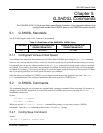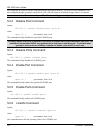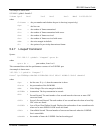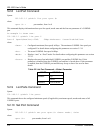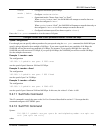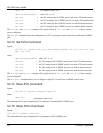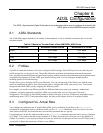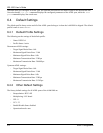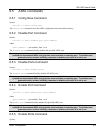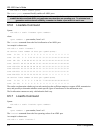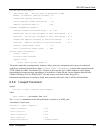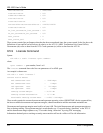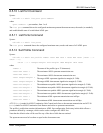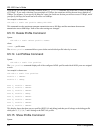
IES-1000 User’s Guide
ADSL Configuration 6-1
Chapter 6
ADSL Configuration
The ADSL (Asymmetrical Digital Subscriber Line) subsystem allows you to configure and monitor the
ADSL ports on the AAM1008 network module.
6.1 ADSL Standards
The AAM1008 supports both the G.lite and the G.dmt standards. G.lite is intended to minimize the cost for the
consumer market.
Table 6-1 Maximum Transfer Rates of the AAM1008’s ADSL Ports
STANDARD MAXIMUM DOWNSTREAM MAXIMUM UPSTREAM
G.dmt 8160 Kbps 1024 Kbps
G.dmt Annex B 8160 Kbps 1024 Kbps
G.lite 1536 Kbps 512 Kbps
T1.413 8160 Kbps 1024 Kbps
6.2 Profiles
A profile is a table that contains a list of pre-configured ADSL settings. Each ADSL port has one (and only one)
profile assigned to it at any given time. The profile defines the maximum and minimum upstream/downstream
rates, the target upstream/downstream signal noise margins, and the maximum and minimum upstream/downstream
acceptable noise margins of all the ADSL ports that have this profile. You can configure multiple profiles,
including profiles for troubleshooting.
Profiles allow you to configure ADSL ports efficiently. You can configure all of the ADSL ports with the same
profile by modifying the profile, thus removing the need to configure the ADSL ports one-by-one. You can also
change an individual ADSL port by assigning it a different profile.
For example, you could set up different profiles for different kinds of accounts (say economy, standard and
premium). Assign the appropriate profile an ADSL port to and it takes care of a large part of the port’s
configuration. You still get to individually enable or disable each port, as well as configure its encapsulation type,
multiplexing mode, VPI, VCI and operational mode. See later in this chapter for how to configure profiles.
6.3 Configured Vs. Actual Rate
You configure the maximum rate of an individual ADSL port by modifying its profile (see the set profile
command) or assigning the port to a different profile (see the
set port
command). However, due to noise and
other factors on the line, the actual rate may not reach the maximum that you specify.
Even though you can specify arbitrary numbers in the
set profile command, the actual rate is always a multiple
of 32 Kbps. If you enter a rate that is not a multiple of 32 Kbps, the actual rate will be the next lower multiple of
32Kbps. For instance, if you specify 60 Kbps for a port, the actual rate for that port will not exceed 32 Kbps, and if
you specify 66 Kbps, the actual rate will not be over 64Kbps.



